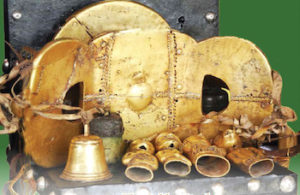
The Golden Stool
*The Golden Stool is celebrated on this date, c 1700. This is the royal and divine throne of kings of the Ashanti people and the ultimate symbol of power in Asante.
The Golden Stool is a curved seat 46 cm high with a platform 61 cm wide and 30 cm deep. Its entire surface is inlaid with gold and hung with bells to warn the king of impending danger. Many have not seen it; only the king, queen, actual prince Ofosu Sefa Boakye, and trusted advisers know the hiding place. Replicas have been produced for the chiefs and, at their funerals, are ceremonially blackened with animal blood, a symbol of their power for generations.
The stool is one of the main focal points of the Asante today because it still shows succession and power. Each stool is made from a single block of the wood of Alstonia boonei (a tall forest tree tropical to West Africa) and carved with a crescent-shaped seat, flat base, and complex support structure. The many designs and symbolic meanings mean that every stool is unique; each has a different meaning for the person whose soul it sits. Some designs contain animal shapes or images that recall the person who used them. Britain's attempt at colonial control occurred in a request for the Golden Stool in 1900.
The general shape of Asante stools has been copied by other cultures and sold globally. If the Golden Stool was ever to be destroyed or captured by the enemies of the Asante Kingdom of Ghana, the whole kingdom would descend into chaos. The Statement above is the warning given by Okomfo Anokye, the priest or traditional healer of the Ashanti empire, who is revered as the most significant and wisest sage of the Asante people and would cofound the Asante empire.
According to legend, Okomfo Anokye, High Priest and one of the two chief founders of the Asante Confederacy, caused the stool to descend from the sky and land on the lap of the first Asante king, Osei Tutu. Such seats were traditionally symbolic of a chieftain's leadership, but the Golden Stool is believed to house the spirit of the Asante nation—living, dead, and yet to be dead.